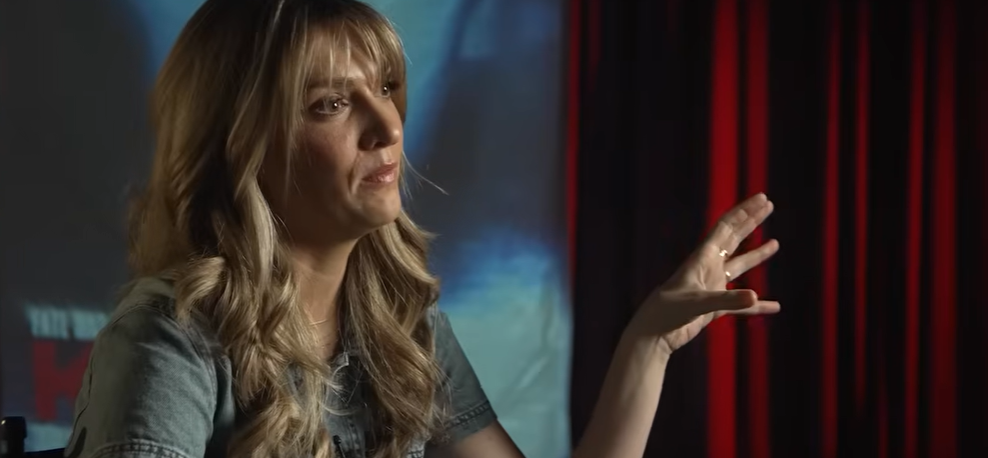Catherine Corcoran’s lawsuit has emerged as a pivotal point. Her case, which is focused on the Terrifier franchise, serves as an example of how ethical boundaries can be crossed and legal requirements disregarded, leading to a rapid breakdown in creative collaboration.
The actress, who portrayed Dawn in the first Terrifier, claims that producer Phil Falcone and director Damien Leone broke their financial and contractual agreements. More remarkably, her lawsuit alleges that the filmmakers used her image and naked photos without her consent, which calls into question fundamental principles of consent and respect in filmmaking.
According to reports, Corcoran’s contract called for a deferred payment plan, which would have paid a meager per diem rate in return for a one percent cut of the movie’s earnings and future sales. Such agreements were typical at the time for low-budget productions, where passion frequently takes the place of compensation. Terrifier, however, turned into an unanticipated success, earning over $100 million from spin-offs and sequels. According to Corcoran, she has only received $8,341, which is a remarkably small amount in comparison to her contractual share.
Her grievance is not limited to the financial aspect. Her allegations of non-consensual nudity during the most explicit scene in the movie are equally important. Because of its intensity, Corcoran’s death scene—in which her character is hung upside down and viciously sawed in half—became notorious. She maintains that she was forced to perform topless without giving the Screen Actors Guild’s (SAG-AFTRA) required written and informed consent. An important protection against exploitation is provided by the rule, which guarantees actors the freedom to refuse or alter nudity requirements without being forced to do so.
Personal and Professional Information
| Detail | Information |
|---|---|
| Full Name | Catherine Corcoran |
| Profession | Actress, Model |
| Known For | Role as Dawn in “Terrifier” (2016) |
| Nationality | American |
| Notable Works | Terrifier, Return to Nuke ’Em High, Long Lost |
| Allegations | Unpaid Profits, Lack of Consent for Nude Scene, Harassment |
| Defendants | Damien Leone (Director), Phil Falcone (Producer) |
| Filed In | Federal Court, Los Angeles, 2025 |
| Representation | Devin McRae, Attorney |
| Reference | NBC News – Catherine Corcoran Lawsuit |

Devin McRae, her lawyer, stressed that there are severe legal repercussions for this failure. He characterized the case as an overdue reckoning and stated that “there are ramifications when producers neglect to obtain written consent.” The lawsuit also claims that, without her consent, explicit photos taken on set were later used on merchandise and promotional materials to continue making money.
This case is especially instructive because it captures the delicate balance between performer rights and artistic freedom. Risk-taking is often the lifeblood of independent filmmaking, but it can be difficult to distinguish between artistic audacity and moral failing. The experience of Corcoran demonstrates how some filmmakers may purposefully or unintentionally disregard their professional responsibilities in the name of shock value.
Additionally, her story speaks to a larger cultural change. The emergence of movements such as #MeToo has forced Hollywood to confront issues of transparency, consent, and boundaries. More control over how their bodies and performances are portrayed is something that actors are calling for. Although safety has significantly improved with the introduction of intimacy coordinators and more stringent on-set procedures, incidents like Corcoran’s show that these standards are still not universal, especially in lower-budget productions.
Corcoran reportedly endured long hours of filming Terrifier while suspended upside down for her death scene, as well as cold and dangerous conditions. She claimed that some prosthetic materials even contained rat feces, which presents a concerning image of disrespect for health and dignity. She also described physical pain and emotional distress. Although independent horror is frequently praised for its unvarnished, do-it-yourself authenticity, her story poses important queries regarding the boundaries between artistic commitment and exploitation.
In terms of money, the disagreement illustrates a persistent problem with entertainment contracts. When accountability fails, backend profit deals—which are frequently alluring to up-and-coming actors—can become legal pitfalls. When the film was a niche endeavor, Corcoran’s 1% stake was negligible; however, as the series gained enormous popularity, it became extremely valuable. Her situation highlights the significance of royalty tracking transparency, an issue that has particularly afflicted sectors such as streaming television and music.
Support for Corcoran has increased in both professional and social circles. Her lawsuit serves as a focal point for many actors who have experienced similar mistreatment. Her readiness to take on a well-known franchise in spite of the unavoidable criticism has been widely praised as exceptionally courageous. Her position may open the door for more stringent enforcement of consent laws and equitable compensation agreements in independent film, as other artists have noted.
However, some commentators and fans continue to hold differing opinions. The lawsuit’s detractors portray the case as opportunistic and claim that Corcoran profited from the publicity the movie gave her. However, these arguments frequently ignore the essential idea that ethics and justice are not ephemeral. Her assertion is about respect, recognition, and establishing a standard for accountability, not just financial gain.
As expected, the defendants have responded defensively. Leone and Falcone’s attorneys refute all of the accusations and state that they will vigorously defend their clients. But public opinion has shifted in favor of Corcoran, especially as information about the unsafe filming conditions and lack of documentation comes to light. The lawsuit itself is no longer the only topic of discussion; industry practices that put spectacle before safety are also being discussed.

